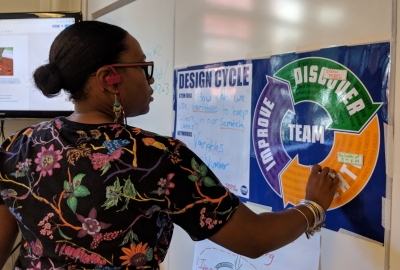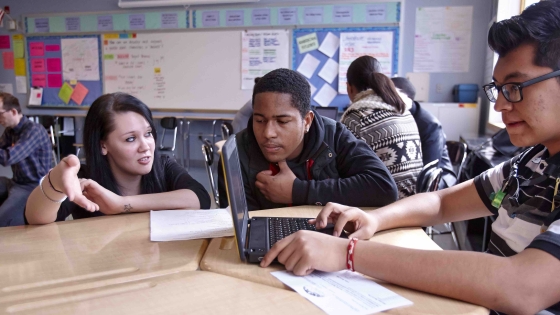
Integrating Computer Science and Computational Thinking into Elementary Science: Lessons Learned from the Maker Partnership
Cheri Fancsali, Zitsi Mirakhur, Sarah Klevan, and Edgar Rivera-Cash (January 2022)
The Maker Partnership Program (MPP) is a research-practice partnership between the Research Alliance for New York City Schools, MakerState, and Schools That Can. MPP developed and tested a new model for building teachers’ capacity to integrate computer science and computational thinking (CS/CT) into elementary science instruction using Maker pedagogy. This report highlights key findings and lessons from our study of MPP and provides access to resources and materials designed for the project, including information about MPP’s approach to teacher professional development, descriptions of Maker instructional strategies, and sample lesson plans.
MPP yielded important insights about building teachers’ capacity for CS/CT integration and the use of Maker pedagogy. These include:
- The value of sustained engagement in PD, with sessions spread throughout the school year;
- The value of hands-on learning, with teachers experiencing the lessons as students would;
- The value of high-quality resources and materials to support instruction (e.g., lesson plans and units, model projects and skill-building videos for students, student assessment rubrics); and
- The need for structured time for teachers to develop and modify lessons and collaborate with peers.
MPP also illuminated challenges to integrating CS/CT into science instruction, including logistical issues (such as hardware and internet access, setting up accounts, and getting students logged into programs); the challenge of serving students with diverse skills and needs; and most predominantly, constraints associated with time and scheduling.
MPP teachers reported that incorporating a Maker approach provided a valuable framework for planning and delivering instruction that facilitated student engagement, creativity, collaboration, persistence, reflection, and independence. This framework helped teachers make a pedagogical shift—from instructors transferring knowledge to facilitators of learning. Teachers found Maker pedagogy to be an effective approach for integrating CS/CT because it allows multiple entry points for students with a wide range of CS/CT skill levels. They also observed that MPP activities were engaging for students, encouraged and provided opportunities for peer collaboration and feedback, and improved problem-solving skills. While this suggests promising outcomes for MPP students, our ability to directly measure student learning and attitudes was hampered by the COVID-19 pandemic. Additional research is needed to fully understand if and how CS/CT integrated into science instruction through a Maker approach improves student outcomes.
Previous articles on the MPP project include:
- "Making" Science Relevant for the 21st Century: Early Lessons from a Research-Practice Partnership. Published as part of the FabLearn 2019 conference proceedings, this paper describes findings from Year 1 of MPP’s implementation.
- Making Research Practice Partnerships Work: An Assessment of the Maker Partnership. Published as part of the Research in Equity and Sustained Participation in Engineering, Computing, and Technology (RESPECT) conference proceedings, this paper provides an assessment of the health of our research-practice partnership, and lessons learned.
This study is funded through the STEM + Computing (STEM+C) program of the National Science Foundation (Award # 1742320).

